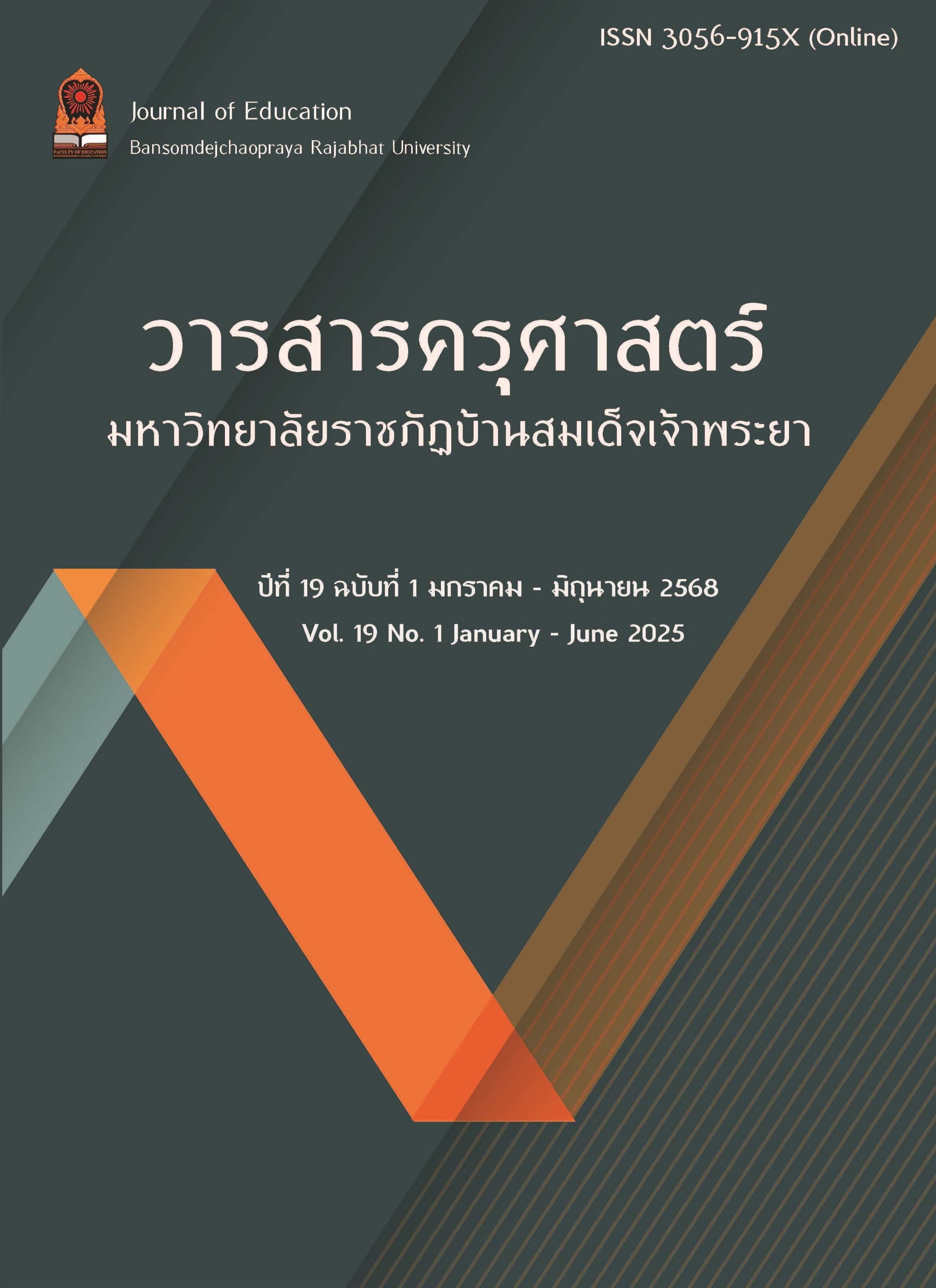Question-Based Learning (QBL) to Promote Critical Reading Skills from Reading English Literary Works on English Program Teacher English Teaching Language Students
Keywords:
analytical reading skills, literature for English Teaching, Question-Based Learning (QBL)Abstract
This research aims to 1) study the result of question-based learning (QBL) to promote critical reading skills from reading English literary works on English program teacher English teaching language students, and 2) study the satisfaction of English major student teachers toward question-based learning to promote critical reading skills. The sample group was purposively selected, consisting of 80 third-year English major student teachers at Lampang Rajabhat University during the second semester of the academic year 2023. These students were chosen because they already had some foundational knowledge of literature for English language teaching and were in the process of preparing for their teaching practicum. Research instruments included 8 lesson plans, implemented over 8 weeks, with 1 class per week, 2 hours per class, totaling 8 classes and 16 hours, a pre- and post-test measuring analytical reading achievement, a satisfaction questionnaire. Data were analyzed using descriptive statistics, including mean, percentage, standard deviation, and t-test for dependent samples.
Research findings:
1. The learning achievement related to the question-based learning (QBL) activities for promoting analytical reading skills in literature for English language teaching showed a significant improvement after participation in the activities, consistent with the research hypothesis. The average score increased by 14.43 points, from a pre-activity mean of M = 9.66, SD = 3.81 to a post-activity mean of M = 24.09, SD = 3.82. The improvement in students' English learning achievement was statistically significant at the level of t(79) = 25.34, p < .01.
2. Students expressed a high overall level of satisfaction toward the question-based learning (QBL) approach for promoting analytical reading skills, which was consistent with the research hypothesis. The overall satisfaction mean was M = 3.98, SD = 0.11. When examined by individual aspects, it was found that students particularly appreciated the ability to communicate in a foreign language (M = 4.14, SD = 0.74), the encouragement to become analytical thinkers and self-directed learners through various creative and sustainable media (M = 4.14, SD = 0.71), and the ability to connect prior knowledge with new knowledge (M = 4.14, SD = 0.77).
Downloads
References
จันทร์ฟอง ปัญญาวงศ์ และวิไลภรณ์ ฤทธิคุปต์. (2565, พฤษภาคม-สิงหาคม). การจัดการเรียนรู้โดยใช้กลวิธีแบบโฟร์บล็อกร่วมกับเทคนิค 5W1H เพื่อเสริมสร้างความสามารถในการอ่านจับใจความสำคัญและเขียนสรุปใจความสำคัญภาษาอังกฤษสำหรับนักเรียนชั้นประถมศึกษาปีที่ 6. วารสารบัณฑิตศึกษา มหาวิทยาลัยราชภัฏเชียงราย, 15(2), 1-13. เข้าถึงได้จาก https://so01. tcithaijo.org/ index.php/crrugds_ejournal/article/view/256593/171539
จิตณรงค์ เอี่ยมสำอางค์. (2566, มกราคม–มิถุนายน). คำถามและกลยุทธ์การใช้คำถามเพื่อการจัดการเรียนรู้. วารสารครุศาสตร์ มหาวิทยาลัยราชภัฏธนบุรี, 1, 53-55. เข้าถึงได้จาก https://so13. tci-thaijo.org /index.php/DRUEDJ/article/view/113/94
จุฑาทิพย์ หาญกุดตุ้ม, สมภารธัชธรณ์ ศิโลศรีไช และสัญญา เคณาภูมิ. (2566, กันยายน-ตุลาคม). การจัดการเรียนรู้โดยใช้คำถามเป็นฐาน. วารสารราชภัฏสุรินทร์วิชาการ, 1(5),67-81. เข้าถึงได้จาก https://so10.tci-thaijo.org/index.php/jasrru/article/view/577/558
ณัฐกานต์ เฟื่องมณี. (2564). การพัฒนาการคิดวิเคราะห์โดยใช้การจัดการเรียนรู้แบบ 5W1H ร่วมกับแผนผังความคิดสำหรับนักเรียนชั้นประถมศึกษาปีที่ 5 (วิทยานิพนธ์ครุศาสตรมหาบัณฑิต). อุตรดิตถ์: มหาวิทยาลัยราชภัฏอุตรดิตถ์.
ปรณัฐ กิจรุ่งเรือง, อรพิณ ศิริสัมพันธ์, ดวงหทัย โฮมไชยะวงศ์ และวิลาพัณย์ อุรบุญนวลชาติ. (2564). ปรับกระบวนทัศน์: การจัดการเรียนรู้โดยใช้โครงงานเป็นฐาน เพื่อสร้างเสริมทักษะสำคัญของผู้เรียนยุคประเทศไทย 4.0. ครุศาสตร์สาร มหาวิทยาลัยราชภัฏบ้านสมเด็จเจ้าพระยา, 15(2), 16-30.
ทิศนา แขมมณี. (2560). ศาสตร์การสอน องค์ความรู้เพื่อการจัดกระบวนการเรียนรู้ที่มีประสิทธิภาพ (พิมพ์ครั้งที่ 21). กรุงเทพฯ: แห่งจุฬาลงกรณ์มหาวิทยาลัย.
พัชรี นาคผง, ศิริวรรณ วณิชวัฒนวรชัย, รุจิราพร รมศิริ, และ มนต์ชัย พงศกรนฤวงษ์. (2564, กรกฎาคม). การพัฒนาทักษะการคิดวิเคราะห์ของนักเรียนชั้นมัธยมศึกษาปีที่ 1 ที่จัดการเรียนรู้โดยใช้ปัญหาเป็นฐานร่วมกับเทคนิค STAD. วารสารศึกษาศาสตร์ มหาวิทยาลัยศิลปากร, 15,176-186. เข้าถึงได้จาก https://so02.tci-thaijo.org/index.php/suedujournal/article/view/251037/169167
ลลิดา วิบูลวัชร. (2561). การจัดการเรียนการสอนวรรณกรรมภาษาอังกฤษตามแนวคิดการตอบสนองของผู้เรียน เพื่อพัฒนาทักษะการคิดวิเคราะห์ของนักศึกษาวิชาเอกภาษาอังกฤษ มหาวิทยาลัยราชภัฏเชียงใหม่. วารสารภาษาปริทัศน์ มหาวิทยาลัยราชภัฏเชียงใหม่, (33), 220-224.
สุวรรณจรัส ธ., ตรีเล้ก ว. และนวลผกา น. . (2024). ผลการจัดการเรียนรู้โดยใช้ปัญหาเป็นฐานที่มีต่อความสามารถในการคิด อย่างมีวิจารณญาณและผลสัมฤทธิ์ทางการเรียนของนักเรียนชั้นมัธยมศึกษาปีที่ 2. e-Journal of Education Studies, Burapha University, 6(3), 16–32. เข้าถึงได้จาก https://so01.tci-thaijo.org/index.php/ejes/article/view/273903
Bloom, B.J. (Ed.). (1979). Taxonomy of Educational Objectives: Handbook/Cognitive 73 Domain. London: Longman.
Boud, D., & Feletti, G. (1996). The challenge of problem based learning (2nd ed.). London: Kogan Page.
Hoban, G. F. (2010). Teacher learning for educational change. Glasgow: Bell & Bain.
Khatib, M., Rezaei S., & Derakhshan A. (2011). Literature in EFL/ESL Classroom. English Language Teaching, 4(1), 201-208.
Krathwohl, D.R. (2002) A Revision of Bloom’s Taxonomy: an Overview. Theory into Practice, 41(4), 212-218.
Rido, A., Kuswoyo, H., & Nuansa, S. (2020). Questioning Strategies in English Literature Lectures in an Indonesian University. Lingua Cultura, 14(2), 241–253. Retrieved from https://journal.binus.ac.id/index.php/Lingua/article/view/6834/4000
Shukri, N.A. & Mukundan J. (2015). A Review on Developing Critical Thinking Skills through Literary Texts. Advances in Language and Literary Studies, 6(2),4-9. Retrieved from http://www.journals.aiac.org.au/index.php/alls/article/view/1316/1305.
Downloads
Published
How to Cite
Issue
Section
License
Copyright (c) 2025 Faculty of Educaion Bansomdejchaopraya Rajabhat University

This work is licensed under a Creative Commons Attribution-NonCommercial-NoDerivatives 4.0 International License.
บทความที่ได้รับการตีพิมพ์เป็นลิขสิทธิ์ของคณะครุศาสตร์ มหาวิทยาลัยราชภัฏบ้านสมเด็จเจ้าพระยา
ข้อความที่ปรากฏในบทความแต่ละเรื่องในวารสารวิชาการเล่มนี้เป็นความคิดเห็นส่วนตัวของผู้เขียนแต่ละท่านไม่เกี่ยวข้องกับมหาวิทยาลัยราชภัฏบ้านสมเด็จเจ้าพระยา และคณาจารย์ท่านอื่นๆในมหาวิทยาลัยฯ แต่อย่างใด ความรับผิดชอบองค์ประกอบทั้งหมดของบทความแต่ละเรื่องเป็นของผู้เขียนแต่ละท่าน หากมีความผิดพลาดใดๆ ผู้เขียนแต่ละท่านจะรับผิดชอบบทความของตนเอง



